Published: march 24, 2010; Intelligence and Terrorism Information Center.
The Political Situation
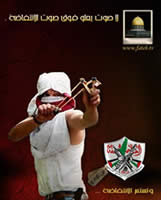
Incitement to violence: “There is no voice but the voice of the intifada,” a paraphrase of the Fatah slogan, “There is no voice but the voice of battle” (From the Fatah Internet forum, March 15, 2010)
The Quartet calls on Israel to freeze building in the settlements and not to destroy buildings in Jerusalem.
The International Quartet (the UN, Russia, the United States and the European Union) issued a statement summarizing its meeting in Moscow on March 19. The main points were the following:1
- Proximity talks – The Quartet believes the proximity talks between Israel and the Palestinians will lead to a resolution of the final status issues. The talks should lead to negotiations which will end the occupation of 1967 and the establishment of an independent, democratic state living side by side with Israel.
- The settlements – The Quartet urges the Israelis and Palestinians to adhere to the Roadmap and calls on Israel to freeze all settlement activity, including natural growth [sic], dismantle outposts erected since 2001 and to refrain from demolitions in East Jerusalem. Both sides are asked to refrain from provocative statements and inflammatory rhetoric, especially in areas of religious and cultural sensitivity.
- Jerusalem – The international community does not recognize the annexation of East Jerusalem and its status must be solved through negotiations between the parties. The Quartet condemns the decision of the government of Israel to build new housing units in East Jerusalem and plans to monitor the developments in Jerusalem.
- The establishment of a Palestinian state – The Quartet supports the Palestinian Authority’s plan to establish an independent Palestinian state. The Quartet takes positive note of Israel’s steps to ease restrictions of movement in the West Bank and endorses fully Prime Minister Fayyad’s state-building and economic development program.
- The situation in the Gaza Strip – The Quartet is deeply concerned by the growing deterioration in the Gaza Strip, including the humanitarian situation. It calls for an end to the smuggling of weapons and for Palestinian unity and the reunification of the Gaza Strip and West Bank. It also calls for the opening of the Gaza Strip crossings, and for the immediate release of Gilad Shalit.
Palestinian prime minister Salam Fayyad praised the Quartet’s statement and said that a mechanism had to be devised and steps taken to translate its positions into action, especially everything concerning construction in the settlements (Wafa News Agency, March 20, 2010).
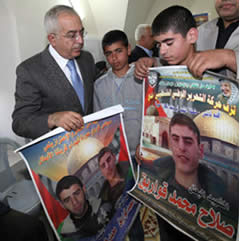
Salam Fayyad pays a condolence to the homes of the two Palestinians killed attempting to attack IDF soldiers (Al-Hayat Al-Jadeeda, March 23, 2010)
The Palestinian Authority Works to Prevent a Third Intifada.
This past week anti-Israeli incitement continued in the Palestinian Authority, even as the PA tried to contain the riots and prevent them from spinning out of control. Spokesmen affiliated with the PA reported in the media that the Palestinians did not seek a third intifada but continued the popular struggle.
During the past week there was a marked decrease in the extent of the riots in Jerusalem, Hebron and other friction sites. Side by side with the calls made by senior Fatah and Palestinian Authority figures for Palestinians to demonstrate and protest, the PA has invested efforts on the ground and in the media to prevent the riots from escalating into a third intifada.
- Muwafaq Matar, who writes for the Palestinian Authority’s official newspaper Al-Hayat al-Jadeeda, published a column which strongly attacked Hamas’ attempt to escalate the situation into a third intifada in Judea and Samaria by exploiting the tension in Jerusalem. According to the column, Hamas knows that shots here and there fired by Palestinians will only help extricate Israeli Prime Minister Benjamin Netanyahu from his recent political isolation. Hamas, it said, wants to call the masses out into the streets “so that [Hamas] will be able to watch Israeli tanks and bulldozers destroy the foundations of an independent Palestinian state.” It also claimed that Hamas was “collaborating with the Devil” in its efforts to weaken the Palestinian Authority and institute “a Muslim Brotherhood state like that in the Gaza Strip” in Judea and Samaria (Al-Hayat al-Jadeeda, March 18, 2010).
- On March 17 the Palestinian Authority security forces initiated a wave of detentions of the rioters in Judea and Samaria who ignored the ban on demonstrations. The media reported that according to eye witnesses, dozens of young people who participated in a demonstration against Israel’s actions in Jerusalem and the dedication of the Hurva synagogue were ordered to go to interrogation centers in various cities in Judea and Samaria. Similar orders were sent to mosque preachers who had incited the public to demonstrate in support of the holy places of Islam in Jerusalem (Al-Bayan Center website, March 18, 2010).
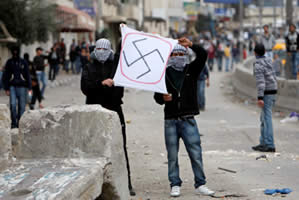
Anti-Israeli incitement continues in the Palestinian Authority: Palestinian demonstrators near the Qalandia roadblock (Photo: Mohamad Torokman for Reuters, March 19, 2010)
Note:
1. sofiaecho.com.



 RSS
RSS

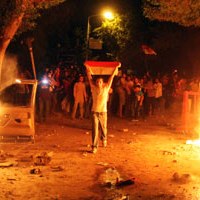
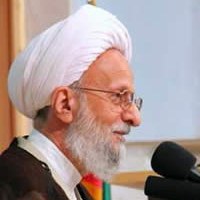
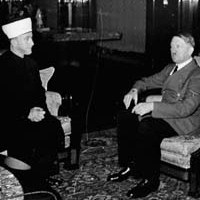
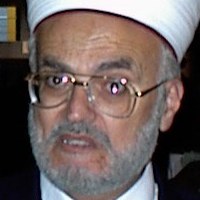
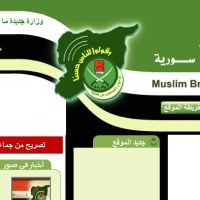




The political situation and Jerusalem #israel #jcot http://j.mp/9gnKAX
The political situation and Jerusalem #israel #jcot http://j.mp/9gnKAX http://ff.im/i6Y9a
RT @CrethiPlethi: The political situation and Jerusalem #israel #jcot http://j.mp/9gnKAX
RT @CrethiPlethi: The political situation and Jerusalem #israel #jcot http://j.mp/9gnKAX
[…] This post was mentioned on Twitter by Elisabeth, Crethi Plethi. Crethi Plethi said: The political situation and Jerusalem #israel #jcot http://j.mp/9gnKAX […]
RT @CrethiPlethi: The political situation and Jerusalem #israel #jcot http://j.mp/9gnKAX http://ff.im/i6Y9a
[…] The Political Situation and Jerusalem | Middle East Affairs … […]